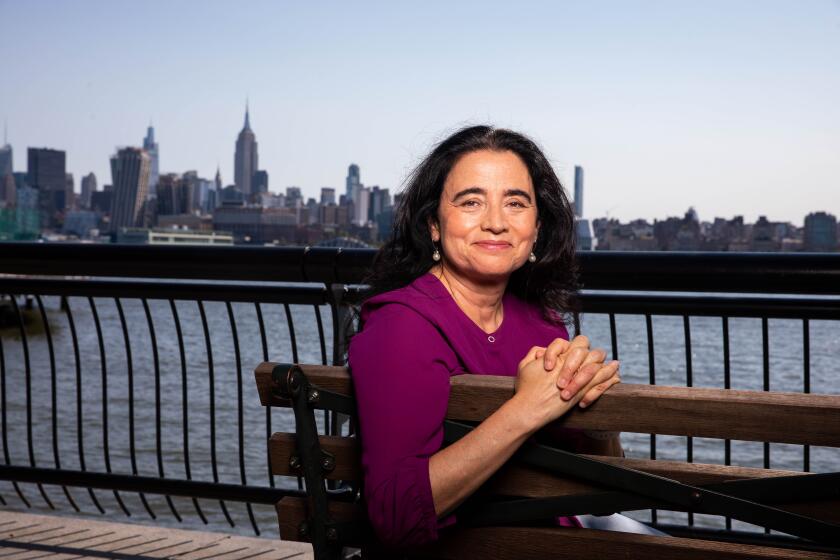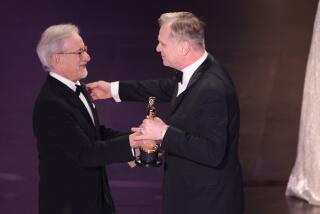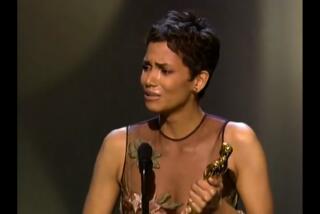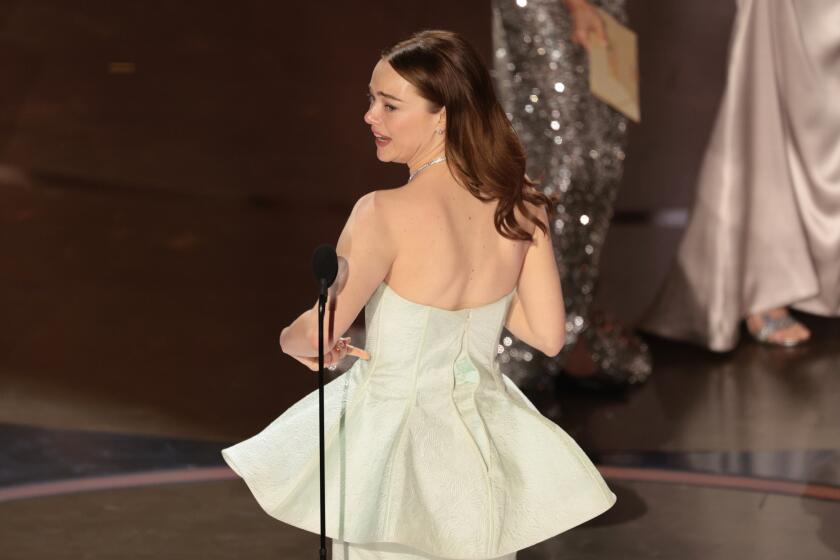The Academy Museum revives the best Oscar speeches. Here are our nominees
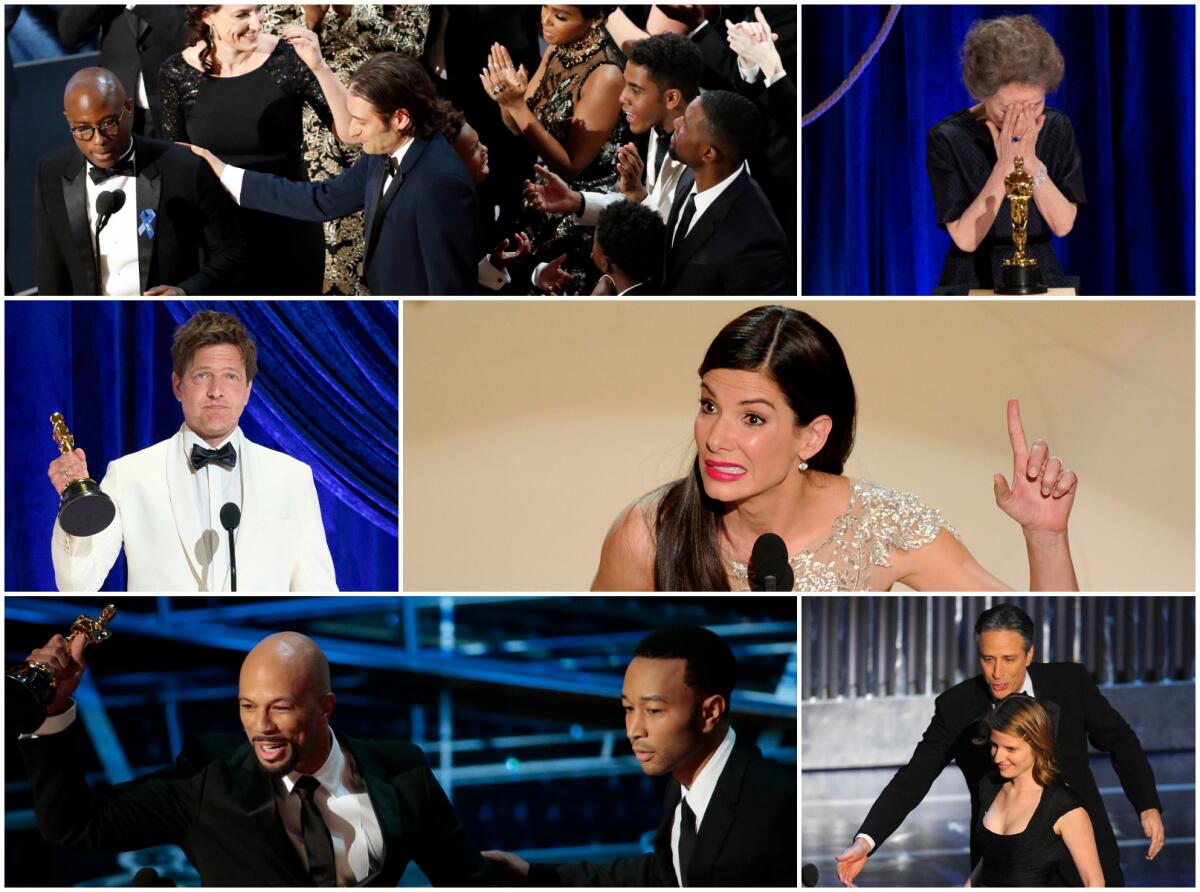
Acceptance speeches can be the best parts of Oscar night, and a gallery at the Academy Museum of Motion Pictures honors many of the most notable, including groundbreaking wins by Hattie McDaniel and Marlee Matlin, and fiery commentary by Michael Moore. We’ve been treated to the heartfelt and the funny, as well as the bizarre and the cringe-worthy. Here are our nominees, with an assist from the BuzzMeter Oscar panel, for six of the most memorable Oscar acceptance-speech moments of the last 20 years.
The graciousness (and Closeness)
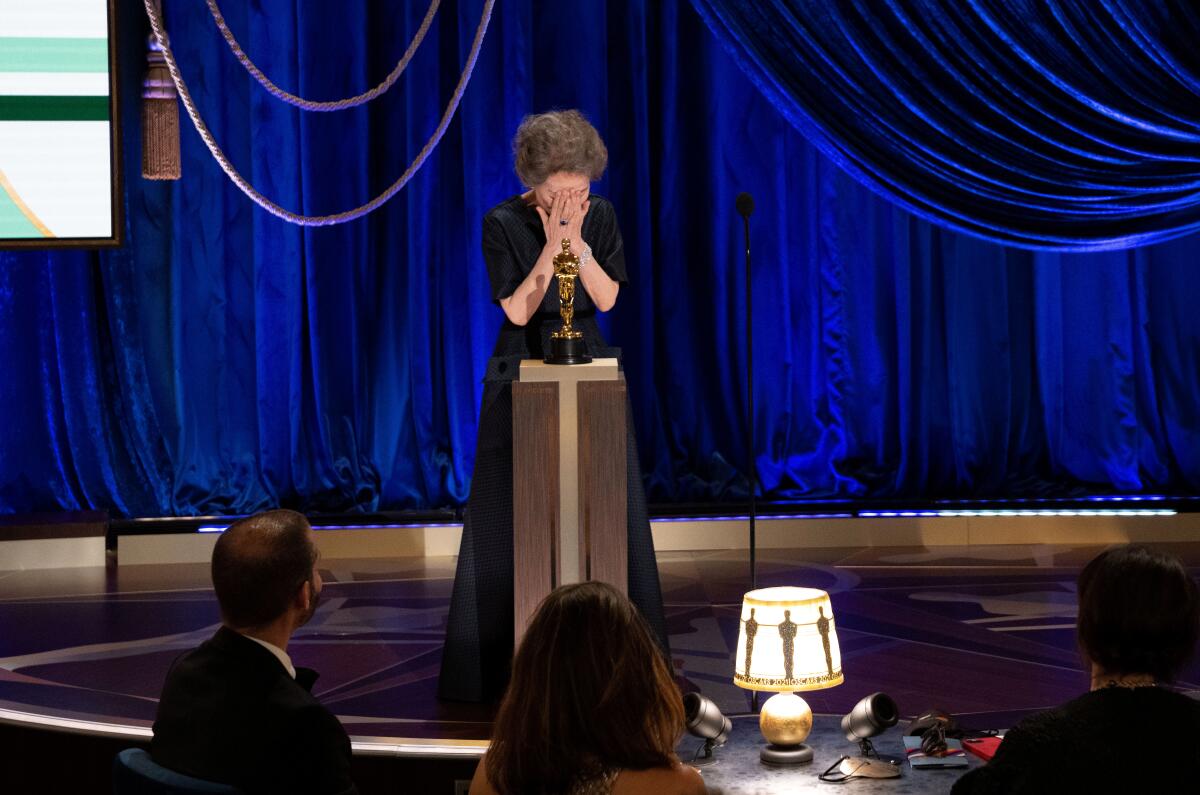
When Olivia Colman won the 2019 lead actress prize for “The Favourite,” she gave one of the most adorably flustered speeches in recent memory, punctuating flabbergasted fragments with noises with impeccable comic timing that the room ate up. She shouted out also-nominated Glenn Close (her seventh), saying, “You’ve been my idol for so long, and this is not how I wanted it to be.” When Colman saw she was being told to wrap up, she blew a raspberry that the crowd just loved.
But the pick here is Yuh-Jung Youn, who won this year for her supporting work in “Minari.” On her way to the stage, she took a moment to pay her respects to also-nominated Glenn Close (her eighth). Once she reached the lectern, Youn noted the trouble Westerners seemed to have with her name: “Tonight, you are all forgiven,” she said, to laughter in the socially distanced room at Union Station. After thanking her “Minari” collaborators, Youn said, “I don’t believe in competition. ... How can I win over Glenn Close? I’ve been watching her for so many performances. So all the five nominees, we are the winner for different movies, we play the different roles. So we cannot compete [against] each other.” The broadcast cut to fellow nominee Amanda Seyfried, visibly moved.
The Academy Museum of Motion Pictures has opened as the ultimate celebration of Hollywood history, Oscar lore and today’s movie makers.
“Tonight, I have a little bit luck, maybe; I’m luckier than you,” said Youn, as the small crowd laughed, “and also maybe American hospitality for the Korean actor?” She finished by thanking her “two boys who make me go out and work. ... This is the result, because Mommy worked so hard.”
The host as mensch
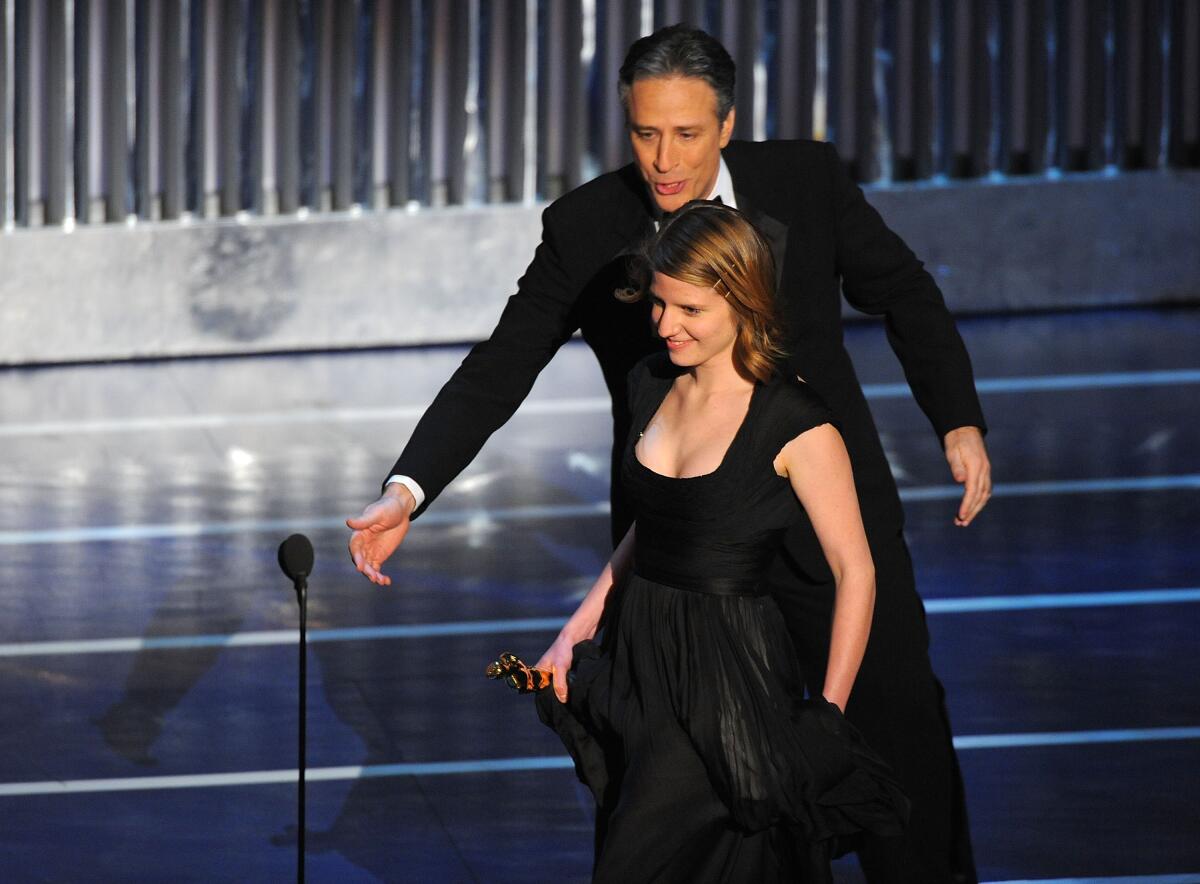
In the eternal mad dash to keep the running time down, the show will often play winners off in the midst of their remarks (as opposed to, say, shortening category intros, staging nominees backstage or eliminating sketches, musical numbers or montages). Julia Roberts famously fended off the “stick man” (the orchestra’s conductor) during her 2001 acceptance speech for her “Erin Brockovich” Oscar, but she’s Julia Roberts.
When the scrappy songwriting duo of Glen Hansard and Markéta Irglová won in 2008 for “Falling Slowly” from “Once,” Hansard spoke for 33 seconds (“We shot on two Handicams, it took us three weeks to make, we made it for 100 grand. We never thought we’d come into a room like this and be in front of you people.”); Irglová spoke for ... 0. She was played off without having an opportunity to say a word. Fortunately, that year’s host was Jon Stewart.
After Hansard’s humble remarks, Stewart deadpanned, “Wow, that guy is so arrogant,” and moved the show along. But when the broadcast returned from commercial, he said, “I just want to do something very quickly. The winners of best song — Markéta Irglová — didn’t get to say her thank you, so I just want to bring her out her again real quick.” He ushered Irglová back to center stage as the house applauded, and said, “There you go. Enjoy your moment.”
“Hi, everyone,” she said. “I just want to thank you so much. This is such a big deal, not only for us, but for all other independent musicians and artists that spend most of their time struggling. The fact that we’re standing here tonight ... it’s just proof that no matter how far out your dreams are, it’s possible. Fair play to those who dare to dream and don’t give up.”
She spoke for 37 seconds, which seemed well spent for the telecast.
The heartbreak
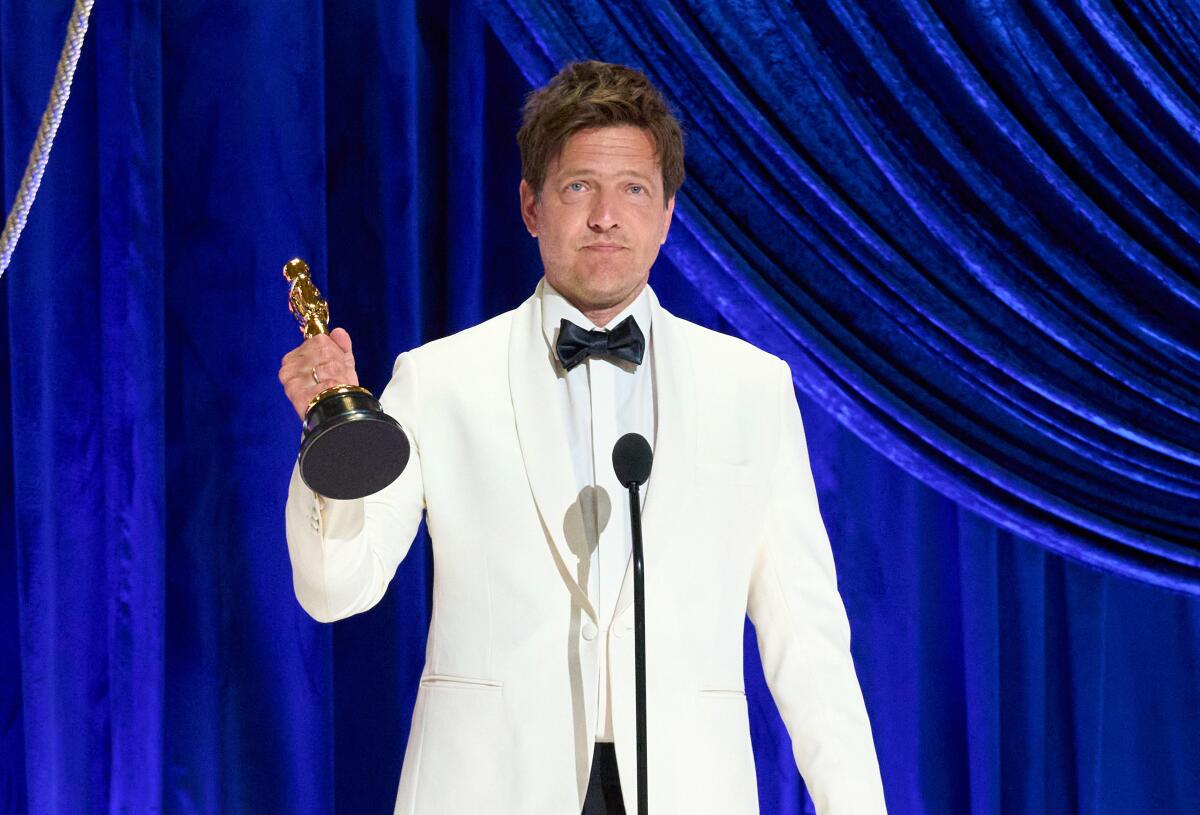
When Thomas Vinterberg accepted the international-feature Oscar earlier this year for directing “Another Round,” he thanked his wife for helping him through “this difficult time” and the crew “who threw everything they had in their hands to rescue me and rescue this film.” He praised his leading actor, Mads Mikkelsen, saying, “Mads, you gave us your finest — not just for the film, but for my daughter as well. And I’ll never forget it.”
He blew out an exhalation. “We wanted to make a film that celebrates life, and four days into shooting, the impossible happened. An accident on the highway took my daughter away. Someone looking into cellphone,” he said, tightening his mouth. “And we miss her, and I love her.”
He composed himself, wiped a tear and apologized to those watching. “Two months before we shot this movie, two months before she died, she was in Africa, she sent me a letter. She had just read the script, and she was glowing with excitement. She loved this and she felt seen by this, and she was supposed to be in this. If anyone dares to believe that she’s here with us somehow, you’ll be able to see her clapping and cheering with us. We ended up making this movie for her, as her monument. So, Ida, this is a miracle that just happened, and you’re a part of this miracle. Maybe you’ve been pulling some strings somewhere, I don’t know. But this one is for you,” he said, holding up the Oscar.
The message
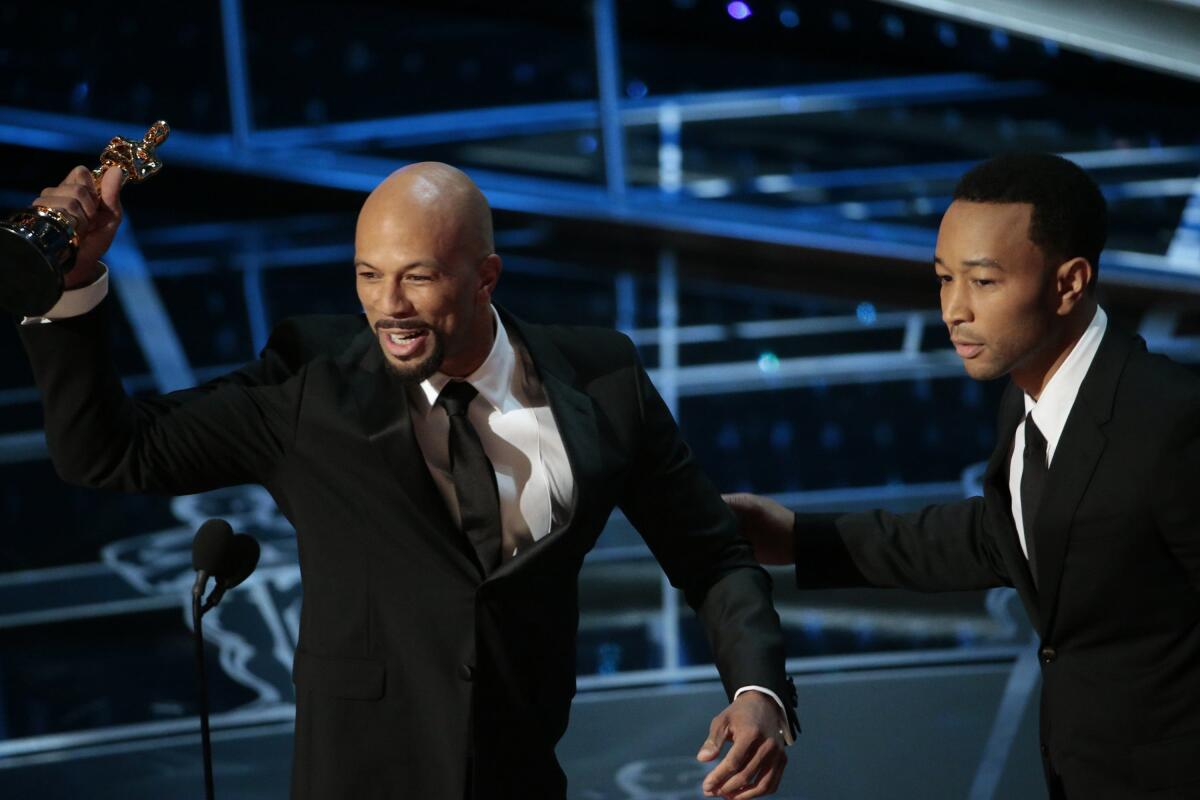
Political appeals are sure to get strong reactions, sometimes even in the room at the Oscars. One of the most divisive came when Michael Moore, on winning the 2003 documentary prize for “Bowling for Columbine,” said, “We live in a time when we have fictitious election results that elects a fictitious president,” referring to George W. Bush’s 2000 win. Loud cheers and boos erupted (the boos having the edge in volume). “We live in a time where we have a man sending us to war for fictitious reasons,” he continued over the shouts, presaging his next film, “Fahrenheit 9/11,” which became the highest-grossing documentary ever but was not nominated for the Oscar.
It’s more difficult, however, to assail political appeals when they manage to be inclusive, evocative and specific all at the same time, as were the comments by Common and John Legend on winning the 2015 original song Oscar. Their song “Glory” is from “Selma,” the chronicle of a hinge moment in Martin Luther King Jr.’s civil rights campaign in 1965. Common said, “Recently, John and I got to go to Selma and perform ‘Glory’ on the same bridge Dr. King and the people of the civil rights movement marched on 50 years ago. This bridge was once a landmark of a divided nation, but now, it’s a symbol for change. The spirit of this bridge transcends race, gender, religion, sexual orientation and social status. The spirit of this bridge connects a kid from the South Side of Chicago dreaming of a better life to those in France standing up for their freedom of expression, to the people in Hong Kong protesting for democracy. This bridge was built on hope, welded with compassion and elevated by love for all human beings.”
Legend tied the civil rights struggle of the ‘60s to contemporary battles over voting rights and also pointed out “there are more Black men under correctional control today than were under slavery in 1850. When people are marching with our song, we want to tell you we are with you; we see you, we love you and march on.”
The charmer
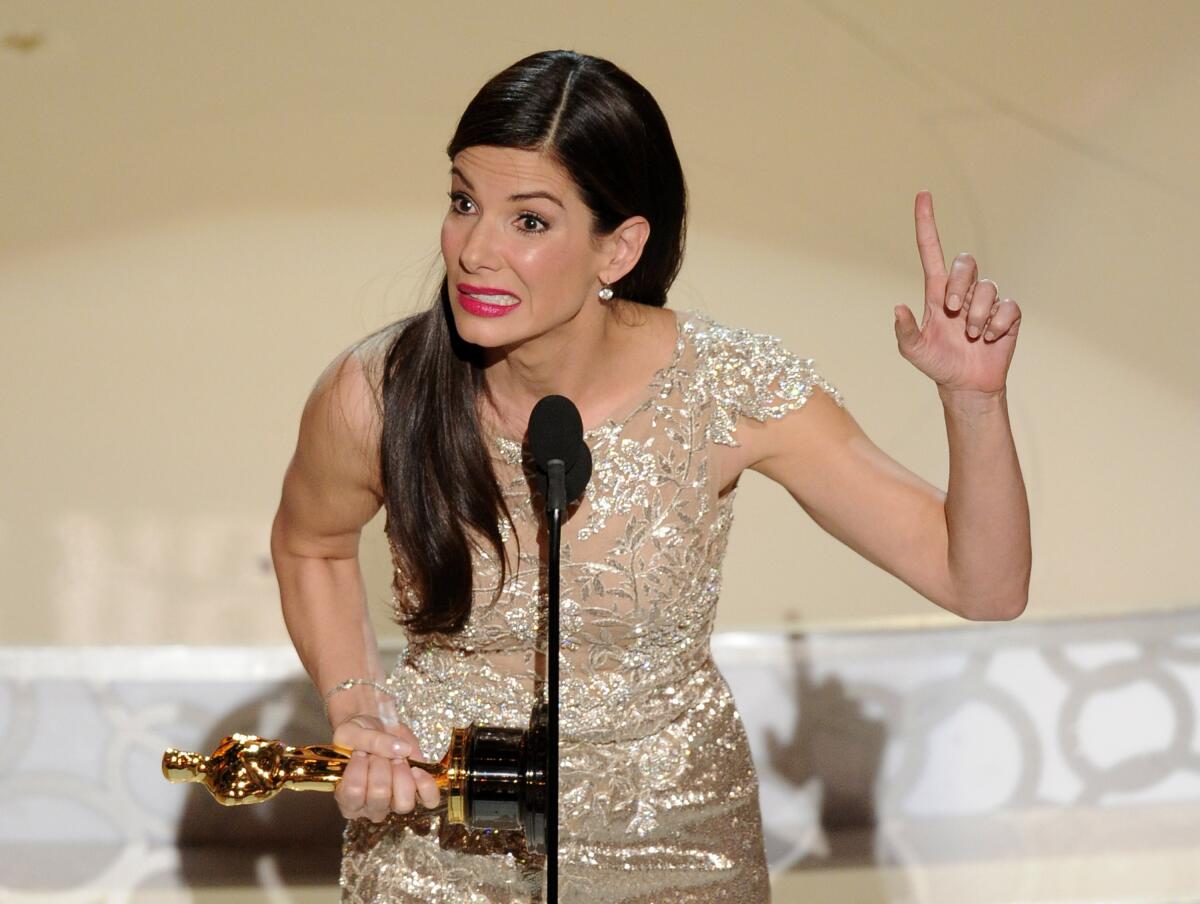
Sandra Bullock had a roller coaster March 6 and 7, 2010.
On the 6th, she won the Razzie Award for worst actress, for her performance in “All About Steve” (6% on Rotten Tomatoes). And she showed up to accept. She said she was glad for the “win” because it meant, considering the Golden Raspberry Award Foundation’s 700 voters, around 352 people, at least, must have seen the movie (not allowing for victory by plurality) — though she called even that into question later in her speech. She brought with her a wagon full of DVDs of the film for the voters in attendance, urging them to watch “Steve.” Whether that was a blessing or curse shall be left to those who did see it.
The next night, Bullock won the Oscar for lead actress in “The Blind Side.” Though she did not bring a wagon full of prizes for academy voters, she asked, “Did I really earn this, or did I just wear y’all down?” She said very nice, specific things about each of the other nominees (of whom Glenn Close was not one), including praising “my lover” Meryl Streep for being such a good kisser and saying to Carey Mulligan, “Your grace and your elegance and your beauty and your talent ... makes me sick.”
Then she dedicated the award to women like her “Blind Side” character: “the moms that take care of the babies and the children, no matter where they come from. Those moms and parents never get thanked. I, in particular, failed to thank one.” She choked back tears. “So ... if I could take this moment to thank Helga B. ... for not letting me ride in cars with boys until I was 18 ‘cause she was right, I would have done what she said I was gonna do. For making me practice every day when I got home ... and for reminding her daughters that there’s no race, no religion, no class system, no color, nothing — no sexual orientation that makes us better than anyone else. We are all deserving of love.”
The warm center of the chaos
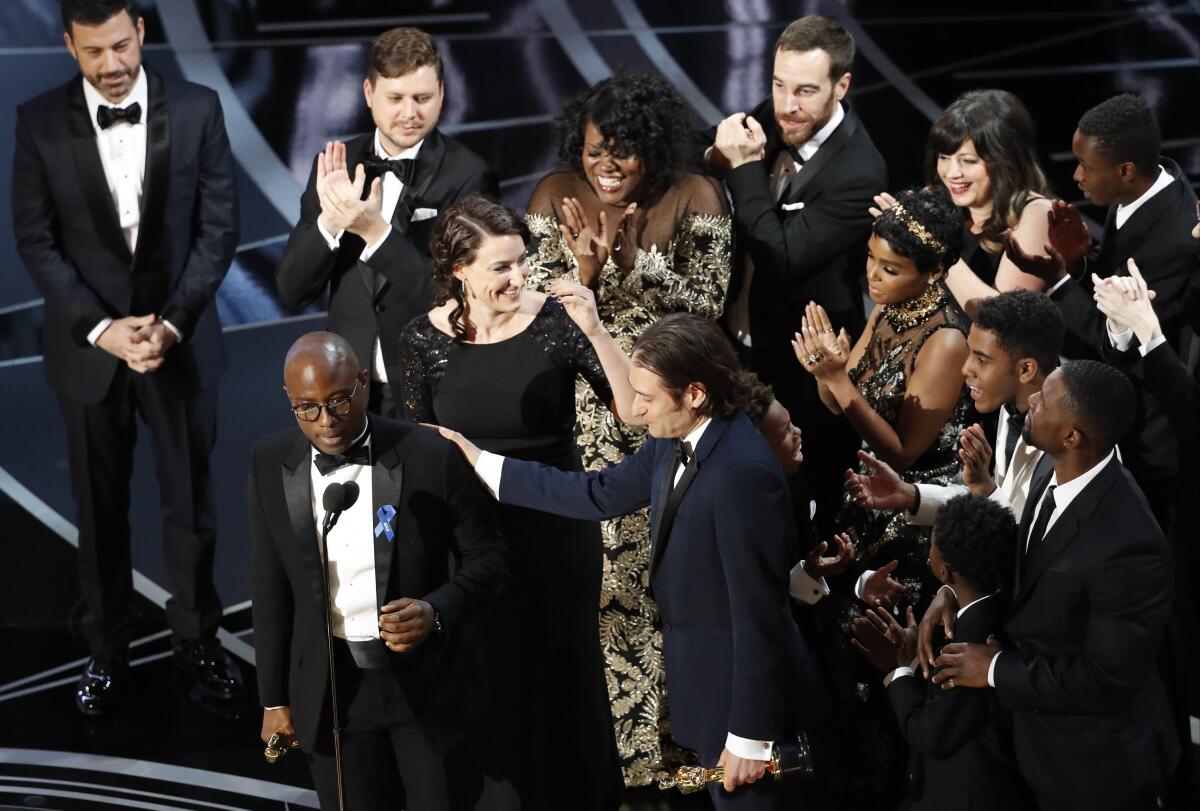
In what has to be the biggest onstage gaffe in Oscar history (no, the 1974 streaker doesn’t count here, but Adrien Brody’s 2003 unsolicited kiss of Halle Berry was in the running), presenters Warren Beatty and Faye Dunaway seemed to give the best picture Oscar to “La La Land” in 2017. The problem? The real best picture winner was “Moonlight.”
In the confusion following what turned out to be an envelope snafu, several erroneous thank yous were given at the mic by the “La La Land” team, led by producer Jordan Horowitz. However, as the other producers gave their acceptance speeches, some scrambling was visible behind them. Once the truth of the situation became clear to those onstage, Horowitz returned to the mic and said, “There’s a mistake. ‘Moonlight,’ you guys won best picture.” He showed the card from the correct envelope to the cameras and a stunned Dolby Theatre crowd. To his credit, Horowitz then said, “I’m gonna be really proud to hand this [Oscar] to my friends from ‘Moonlight.’ ”
When the “Moonlight” team took the stage to accept, director-adapter Barry Jenkins began by saying, “It’s true; it’s not fake. We’ve been on the road with these guys [from “La La Land”] for so long, and that was so gracious, so generous of them. My love to ‘La La Land.’ My love to everybody. Man.”
Cameras even caught Samuel L. Jackson in the audience, taking photos of the “Moonlight” crew’s acceptance speeches and wiping a tear.
Watching it again, it’s as stunning a moment today as it was when it happened. But the main takeaway isn’t the chaos, or even producer Adele Romanski’s heartwarming remarks about inclusion and representation (“It’s so humbling to be standing here with hopefully still the ‘La La’ crew — no, OK, they’re gone — but I hope [this win is] inspiring to people, little Black boys and brown girls and other folks watching at home who feel marginalized and who take some inspiration from seeing this beautiful group of artists”). The main takeaway is the real admiration, friendship and camaraderie that had developed between the two films’ makers during the long road to the Oscar.
The director couldn’t land work despite the 2002 success of “Real Women.” Now Patricia Cardoso gets long-overdue recognition at the Academy Museum.
More to Read
Only good movies
Get the Indie Focus newsletter, Mark Olsen's weekly guide to the world of cinema.
You may occasionally receive promotional content from the Los Angeles Times.

